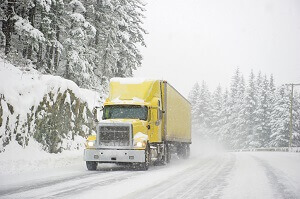 Recently, a 60-vehicle pileup shut down an interstate in Ohio for 14 hours. USA Today reported the incident was "triggered by heavy lake-effect snow." While the crash involved lots of different vehicles of all types, the initial crash started with a Greyhound bus and more than a dozen trucks. The multi-car pileup left at least three victims with serious injuries.
Recently, a 60-vehicle pileup shut down an interstate in Ohio for 14 hours. USA Today reported the incident was "triggered by heavy lake-effect snow." While the crash involved lots of different vehicles of all types, the initial crash started with a Greyhound bus and more than a dozen trucks. The multi-car pileup left at least three victims with serious injuries.
Unfortunately, truck accidents are common during Ohio's snowy winters. While anyone could get into a collision because of bad weather, truck drivers face an especially substantial risk of truck collisions. If a trucker is at fault for causing a crash because the driver breaks the rules of the road or is carelessness enough not to adjust his driving to account for winter weather, the trucker and trucking company could be held liable for any resulting harm occurring in an accident the trucker causes.
Risks of Ohio Truck Accidents during Snowy Weather
Truck drivers face a disproportionate risk of involvement in truck collisions because:
- Long-haul truckers may travel into snowy areas from warmer climates. It is common for truckers to transport goods and raw materials across the country. If a truck driver from a warmer climate travels into Ohio and suddenly encounters snow and ice on the roads, the trucker may not be as familiar with how to safely drive under these conditions, as compared with someone who lives locally. This driver is at substantial risk of causing an accident to happen.
- Truck drivers often feel pressure to drive in bad conditions. Truckers do not make money if they are not driving. They have delivery deadlines to make, and do not want to let employers down by being late with delivery. A trucker shortage also puts pressure on truckers to complete deliveries in a timely manner. This all means that truckers may be more likely to opt to drive even in conditions when other motorists may stay home.
- Truckers have time limits for driving. There are rules limiting the total number of hours truckers can drive daily and weekly. These rules are intended to prevent drowsy driving crashes but can increase the risk of collisions in bad weather. A trucker who is allowed to drive only for a total of 11 hours a day may not feel as if he can slow down as much as he should to accommodate bad weather conditions because then he will reach his maximum drive time without covering the necessary ground.
While truckers may be pressured to make dangerous driving choices during bad weather, none of this is an excuse to forgo safety. If a trucker does something careless and a crash happens, victims need to know what their options are for making a damage claim in order to receive compensation for the damages and injuries they have suffered.








